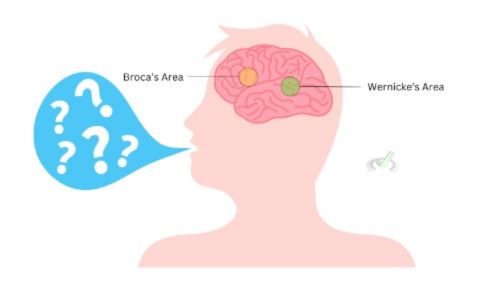Language is a powerful tool that affects how our brain works and how we think. Understanding the effects of language on the brain and cognition helps us see why language is so important in our daily lives and education.
I. Language and Brain Structure: How Language Shapes the Brain
Language changes how our brain is structured. Different parts of the brain help us process language, and using language can change these areas over time.

Broca’s Area
Broca’s area is in the frontal lobe, usually on the left side of the brain. It helps us speak and form sentences. This area also helps us move our mouth and tongue to speak. If Broca’s area is damaged, it can be hard to speak clearly. This is called Broca's aphasia.
Wernicke’s Area
Wernicke’s area is in the temporal lobe, which helps us understand spoken and written language. It helps us make sense of the words and sentences we hear or read. If Wernicke’s area is damaged, a person might speak fluently, but their sentences might not make sense. This is called Wernicke's aphasia.
Neural Plasticity
Neural plasticity, or brain plasticity, is the brain's ability to change and adapt. Learning a new language can cause changes in the brain, like making certain areas more active or bigger. For example, the hippocampus, which helps with memory, and the left side of the brain, which helps with language, can grow in people who speak more than one language.
II. Language and Cognitive Development: How Language Affects Thinking
Language shapes how we think and understand the world. It plays a big role in our cognitive development.
Vocabulary and Thought
The words we know and use can change how we think. This idea is called linguistic relativity. For example, having many words for different kinds of snow can help someone understand snow better. This shows that language can shape how we see and understand the world.
Problem-solving and Critical Thinking
Language skills are important for problem-solving and critical thinking. Being able to describe a problem in words helps us think through solutions. For example, when solving a math problem, explaining the steps in words can make it easier to understand.
Bilingualism and Cognitive Flexibility
Bilingualism means speaking two languages. Bilingual people often have better cognitive flexibility. This means they can switch between tasks more easily and think about many things simultaneously. This skill comes from managing and switching between different languages, strengthening the brain in these areas.
III. Language Disorders: When Language Processing Goes Wrong
Sometimes, language processing can be disrupted by disorders, which can affect how we communicate and think.
Aphasia

Aphasia is a condition that makes it hard to communicate. It can happen due to a brain injury, like a stroke. There are different types of aphasia:
- Broca's Aphasia: Makes it hard to form complete sentences and speak clearly.
- Wernicke's Aphasia: Makes it hard to understand language, leading to sentences that might sound right but don't make sense.
- Global Aphasia: A severe form where both speaking and understanding are impaired.
Dyslexia
Dyslexia is a learning disorder affecting reading. People with dyslexia may have trouble recognizing words, spelling, and breaking down words into sounds.

It often involves problems with phonological processing, which means breaking words into sounds. Dyslexia does not affect intelligence; many people with dyslexia are very smart and creative.
Specific Language Impairment (SLI)
SLI is a condition where children have trouble learning language despite no clear cause. These children may have problems with grammar, vocabulary, and forming sentences. SLI can affect their school work and social interactions, making it hard to follow conversations or express themselves clearly.
IV. Benefits of Learning Multiple Languages: Expanding the Brain’s Abilities
Learning more than one language benefits the brain and thinking skills.
Improved Memory
Learning multiple languages can improve memory. Bilingual people often have better short-term and long-term memory because they practice using different languages. This practice strengthens their memory systems.
Enhanced Multitasking Skills
Bilingual people are often better at multitasking. They can switch between tasks more easily because they are used to switching between languages. This skill, called cognitive flexibility, is useful in everyday life and many jobs.
Delayed Onset of Dementia
Research shows that being bilingual can delay the start of dementia, which affects memory and thinking skills. Using multiple languages helps keep the brain active and builds cognitive reserve, which protects against age-related decline.
V. Bridge/Overlap
Language studies connect to many other fields, including topics covered on the MCAT and in psychology.
Neurotransmitters and Neural Communication
Neurotransmitters are chemicals in the brain that help transmit signals between nerve cells. They are crucial for language processing. For example, acetylcholine is important for attention and learning, which are necessary for learning languages.
Brain Lateralization
Language processing usually involves the left side of the brain. This is called brain lateralization. Understanding this helps explain why damage to certain areas, like Broca's or Wernicke's areas, leads to specific language problems. It also helps explain why some people are right- or left-handed, which can affect language processing.
Developmental Psychology
Enter your text here...
Psycholinguistics
Psycholinguistics studies how people understand, produce, and remember language. It looks at the psychological and brain-based factors that make language use possible. This field connects with cognitive psychology by studying how language affects thinking.
Sociocultural Influences
Language is a big part of culture. It shapes how we see ourselves and interact with others. Sociologists study how language affects social behavior and group identity, including how language can bring people together or create divisions. Understanding these influences helps us respect and navigate cultural differences.
VI. Wrap Up/Key Terms
Let's review the key points:
- Broca’s Area: Brain area that helps produce speech.
- Wernicke’s Area: Brain area that helps understand language.
- Neural Plasticity: The brain's ability to change and adapt.
- Linguistic Relativity: The idea that language influences thought.
- Aphasia: A condition affecting communication, with types including Broca's, Wernicke's, and Global Aphasia.
- Dyslexia: A learning disorder affecting reading and phonological processing.
- Specific Language Impairment (SLI): Difficulty learning a language without a clear cause.
- Bilingualism: Speaking two languages leads to benefits like improved memory and multitasking skills.
- Neurotransmitters: Chemicals that transmit signals in the brain, important for language processing.
VII. Practice
Test your understanding with these questions:
Sample Practice Question 1
What does Broca’s area do?
A. Helps understand language.
B. Involves memory formation.
C. Produces speech.
D. Controls balance.
Ans. C
Broca's area is a part of the brain that helps us talk. It's in the front part of our brain. People might have trouble speaking clearly if this area gets hurt, but they can usually still understand what others say.
Sample Practice Question 2
How can learning multiple languages benefit the brain?
A. It reduces memory skills.
B. It improves multitasking abilities.
C. It causes language disorders.
D. It has no effect.
Ans. B
When you learn more than one language, your brain gets better at doing several things at once or switching between tasks. Kids who speak multiple languages often become better at focusing and juggling different activities because their brains get a good workout!







 To help you achieve your goal MCAT score, we take turns hosting these
To help you achieve your goal MCAT score, we take turns hosting these 
